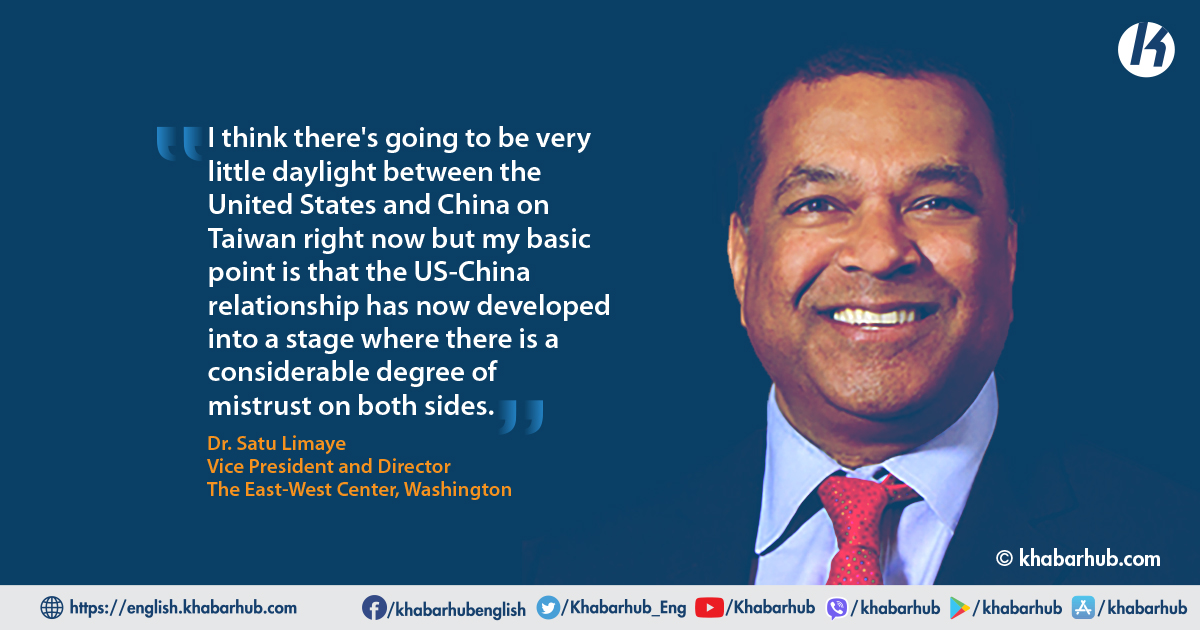Dr. Satu Limaye is Vice President & Director of the East-West Center in Washington. He is the founding editor of the Asia Pacific Bulletin, Senior Advisor to China & Indo-Pacific Division at the Center for Naval Analyses and Senior Fellow on Asia History and Policy at the Foreign Policy Institute at Paul H. Nitze School of International Studies (SAIS).
He received his doctorate from Oxford University. He currently serves on the Korea Economic Institute (KEI) Advisory Council, the Taiwan-Asia Exchange Foundation, and the National Bureau of Asian Research East Asia Study Group.
He has several publications. Previously he was a Research Staff Member of the Strategy and Resources Division at the Institute for Defense Analyses and Director of Research and Publications at the Asia-Pacific Center for Security Studies, a direct reporting unit of the U.S. Pacific Command.
He has been an Abe Fellow at the National Endowment for Democracy and a Henry Luce Scholar and Research Fellow at the Japan Institute of International Affairs in Tokyo.
Dr. Pramod Jaiswal, Strategic Affairs Editor at Khabarhub, spoke to Dr. Satu Limaye on QUAD and the US Foreign Policy.
How do you look at the Biden Administrations’ engagement with the QUAD as a diplomatic consultation with special attention to the elevation of the QUAD meetings to the summit level and the head of the government level? Does it mark the continuity of Trump’s administrations’ engagement with the QUAD nations or do you find a sudden new change in the approach?
As you know the QUAD began last century, previous to this administration in 2007 and has steadily gone through some ups and downs increasing its salience and importance.
So, any time the US can work with two close allies such as Japan and Australia along with very good strategic partners such as India.
It’s a very productive and positive development for US foreign policy and the region. Its elevation to a leader-level meeting seems to be a natural development, given the fluid nature of the Indo-pacific security environment.
And I think we can see more on such a front including cooperation not only in vaccines as we’ve heard but potentially infrastructure, rulemaking and rule-setting agendas in the region and including military exercises and other issues.
So overall, I think it’s a very positive development from the US perspective and certainly, the countries participating are actively interested as well.
What are the potentials and limitations of the Quad based on the four dimensions of power — diplomacy, information, military and economy, also known as DIME?
It’s a little difficult to predict all of the things that will affect the QUAD going forward but we have already seen in a diplomatic front as you’ve mentioned that it’s moving forward at the leaders’ level.
Summits have been held even during this very difficult time of the pandemic in terms of getting people together. There was a huge commitment by the leaders to travel to Washington to have this meeting so that speaks well on the diplomatic front.
On the military front as you well know there have been some exercises emanating out of the Malabar Exercises between the USA and India which have additional players now, Japan, Australia, the US of course.
So my point is that even on the military front there are some exchanges and interactions but as you well know the quad is not fundamentally a military organization, it’s not an alliance so there will be limitations on what they do.
But I can only imagine that opportunities to share information, potentially some level of intelligence sharing, opportunities to coordinate exercises, perhaps elements related to arms acquisition and production could develop in the future.
On the economic front, we have already talked a little bit in the previous answer that assistance to the vaccination program is huge.
I put this in economic practice because without COVID-19 recovery the world cannot recover economically and socially.
They must cooperate on this, not to mention potentially infrastructural assistance, coordination of development assistance and finance.
So, in all of these ways, it seems to me across the dimension of DIME that you mentioned this innovation, the Quad innovation particularly at the leader’s level with perhaps some institutionalization going forward is a useful tool as we address challenges in the Indo Pacific.
How do you see the maritime militia issue in the Indo-Pacific region?
That’s a big issue. Obviously, China uses several tools to press its claims to the fishing fleets, maritime militia. I think there are very good literature and books on this.
I’m not an expert on maritime militias across the region, certainly, not China’s, but my point is simply that maritime militia is a specific issue about the capabilities, the roles, etc.
Let me broaden the issue on what is more central. The maritime domain is becoming more important to the region from the Indian Ocean east across to the east China sea, south China sea. So, the whole maritime domain is becoming important.
Second, more and more countries are contesting various elements of these maritime disputes, the Japan-China disputes on the East China Sea, the South China Sea disputes, India’s concern about people’s liberation army navy activities in the Indian Ocean and Indian Ocean region States.
So, you can see that the maritime element is more important. And also, there is some element of increasing competition for growing maritime forces.
So, with the rise of the PLA navy, concerns are expressed here in the US as well as many other areas of Europe and throughout the Indo Pacific about those capabilities and what their intentions are, given the quite aggressive and asserted claims of China in the maritime space.
So, what we are looking at is an increasing salience of the maritime theater and just overnights there were reports that the Philippines has objected strongly, the Chinese maritime militia activity in the Philippines claimed territory. So, you can see this has been an ongoing issue and I think will remain a huge issue in the region.

What do you make out of the Biden Administration’s recent decision to replace ‘Great Power Competition’ with ‘Strategic Competition’ as the guiding idea of policy—especially, with China, in its national security and national defense strategies?
There has been this debate about what to call, strategic competition, great power competition. My view is, perhaps these words are important analytically and to some extent politically but the fundamentals of a more complicated, more contested relationship between the United States and China, whatever precisely but you give it, is here to stay.
Having said that, I must also note, given the meeting between President Biden and President Xi, the announcement of potential strategic stability talks on the nuclear issues.
Some agreement appears to be in the making on journalism exchanges so, you can see that this runs on multiple tracks.
On the one hand, we’ve had very tense relations, difficult meetings over the first 10 or 11 months of the new Biden administration with their Chinese interlocutors but here we have an effort at the highest levels to sort of put a different tone on the relationship.
I don’t think it changes the fundamental competitive elements of the relationship, even contested elements of the relationship but it does mark something of an effort to sort of manage this competition, whatever it’s called, strategic or great power.
That’s where I see things right now and we shall have to watch very carefully how they proceed.
What does the emergence of the AUKUS partnership mean to QUAD? Will the partnership complement or compete with the Quad since it is far more overt in its mission?
Yes, you’re referring to Australia, US, UK arrangements. Most notably the submarine deal but just, in general, the greater competition, from everything from cyber to security and defense and the QUAD which includes the US, India, Japan and Australia of course.
I don’t think these are contradictory at all, I don’t think they’ll run into each other as we talked about earlier. I think QUAD has a different set of purposes, it’s not a military alliance.
The AUKUS is between 3 alliance partners who’re also very important intelligence partners as you well know so, I think they do not conflict or compete at all, and any effort that brings our allies into greater coordination is very useful esp. to the US defense and security policy.
Therefore, the QUAD and AUKUS together in my judgment compliment in the region along with our continuing bilateral relationships in the region, our membership and activities to multilateral and international organizations.
On the defense and security front AUKUS is a new arrangement and we will just have to see how it proceeds as you well know at a minimum on the submarine deal, we are talking, sometime before those can be built, in the meantime, we may see other arrangements such as leasing of nuclear submarines or other such arrangements. We just have to wait and see what the governments announce.
With the growing sympathy for Taiwan’s plight in the United States, and with heightened rhetoric, is the US moving away from ‘strategic ambiguity’ on Taiwan?
Our official policy is not moving away from strategic ambiguity in Taiwan. As you well know there have been various statements including by the president that have raised these issues.
There is a robust debate in the United States about how we should frame our policy in terms of strategic ambiguity regarding Taiwan.
But so far as I know there’s been no change in official policy. We are obligated to the defense of Taiwan under the Taiwan relations act that has been repeated in President Xi and President Biden’s meeting that was reiterated.
There continue to be differences of views with obviously concerns on the part of the United States that China is pursuing activities that are prejudicial to Taiwan’s safety, health, and security and movements in the US to recognize even in more direct and stark terms how important Taiwan is, whether that be on semiconductors, trade, democracy, need for health collaboration in the context of the pandemic, international representation.
I think that we’re at a point where we’re at a critical phase of the US-China relationship and US – Taiwan relationship and we will have to navigate that very carefully because it is perhaps the greatest issue of disagreement and contest between the United States and China.
How do you view the role and significance of middle powers esp. the South and Southeast Asian countries in the region? How can these countries jointly work with the USA in different avenues in the region?
In my view, it depends on how you decide to define it and, in each region, people have different views but the US and China are the big players in the region, let’s not kid ourselves but the roles of countries such as India, Japan, Korea, Australia, Indonesia and Vietnam, these are big countries, these are big, important countries.
You can look at all the G20 members if that’s a cut-off for someone to find any middle power and the US has strategic partnerships and alliances with these countries.
We have an alliance with the Republic of Korea, Australia, Japan, we have a strategic partnership with India and we have a growing relationship with Vietnam and long-standing ties with Indonesia that are in my estimation growing close.
To my mind, all of these countries at different levels, in different forms, and different partnerships play critical roles for US policy in the region and as you can see over the last 20 years our relationships have become thicker, wider and deeper throughout the Indo – Pacific region.
What are the challenges in maintaining freedom of navigation and overflight in the Indo-Pacific region? What could be the viable options for dealing with the rising level of maritime disputes in a rules-based order?
We’ve been doing freedom of navigation operations for decades and we do them when we consider claims to be excessive as outlined by UNCLOS.
There are differences of interpretation on UNCLOS throughout the world and throughout the region but the US continues to do freedom of navigation operations, not least in the South China Sea but elsewhere as well and with both partners as well as non – partners.
So, I think we will continue to do that. It’s important to do that as part of US Navy and Air Force policy as well as US defense policy, so I anticipate no major changes and as for an immediate solution to these contested issues, there isn’t any immediate solution as you know there are legal approaches such as the permanent court of arbitration and the UNCLOS ruling on the South China Sea.
There are continuing in my view stalemate in the East China Sea and so, we will continue having to work with these issues.
There are also ongoing efforts between China and regional claimants in the South China Sea that have discussions. Those have gone on for years and years without moving forward.
So, we’ll just have to continue on the legal level, on the insurance of the UNCLOS level and the level of the bilateral negotiations. To seek solutions and at least manage these disputes at a minimum as we go forward.
As China applies to join the Comprehensive and Progressive Agreement for Trans-Pacific Partnership (CPTPP) is China trying to balance the US push for a security pact with economic cooperation? Has it got anything to do with AUKUS?
Well, I can’t speak for the Chinese motives on exactly why they’re choosing to do this. As you know, the TPP was formulated in the last decade.
China at various times looked at that agreement, I’m sure they studied it very closely, now they’ve made a formal application or bid as you know there is a process for this amongst the countries that are already in CPTPP, several steps have to be followed.
I would also note that China is not the only country to apply, Taiwan has applied too, so has the United Kingdom, in the future who knows, other countries.
The US has just done a visit through the region with our top commercial officials, our trade representative and our secretary of commerce were there in the region talking about a new arrangement with the US, Japan to do a more robust CPTPP like arrangement.
So, we just have to see how this evolves. My hunch is that China is seeking to on the one hand pursue coercive economic diplomacy with countries such as Korea and Australia and on the other hand trying to dock on regional agreements.
They’ve already docked on as you well know the RCEP so, China’s strategy I suspect is multi-fold and attempt to show that the US is not in CPTPP.
It’s an attempt to keep Taiwan out of it. It may be an effort to make nice while it’s pursuing economic coercion on the other hand.
So, I’m sure there are mixed motives on the part of China but it’s a question that’s better directed towards China. Why did you seek to join this agreement and how does that square with the other actions that you are taking elsewhere?
What would the CPTPP accession mean for China following the signing of the Regional Comprehensive Economic Partnership? How likely is the USA to rejoin the Trans-Pacific Partnership trade deal shortly?
There is very little prospect of any easy, quick joining of CPTPP or the TPP for that matter. I think we are looking; the President spoke about a new economic framework when he addressed the US – ASEAN meeting and the APEC meeting.
We’ve heard similar kinds of language from our commerce secretary and our US trade representative office, so we just have to see what kind of arrangement the US is looking for.
One issue that gets a lot of attention here in Washington is the potential for a digital trade agreement. So, we’ll just have to see, I’m sure there are a few handfuls of reformers in China who think the CPTPP could create some disappointments with the Chinese economic system.
But I think the economic element of the regional relationships is going to be critical, particularly as we come out of COVID because we’re going to need new ways to make arrangements on digital, technology and supply chains, climate change, sustainable economic initiatives. There are just a lot of things going on in the region.
Amid heightened tensions over Taiwan, China expanding its nuclear arsenal, and recent surprise declaration on US-China to collaborate on cutting emissions, Xi-Biden has a virtual summit. How do you look at the future of US-China Relations?
It’s pretty dense and difficult to see through, my own sense is that the trend of the last ten months is to move towards some sort of managed competition.
At times it’s going to be very acute on certain issues like Taiwan as you mentioned. I think there’s going to be very little daylight between the United States and China on Taiwan right now but my basic point is that the US-China relationship has now developed into a stage where there is a considerable degree of mistrust on both sides.
There is a considerable degree of competition on both sides and that’s not going to be easy to unpack. I think at least what we can expect given what we’ve seen in the last two or three days and the recent agreements about potential strategic stability talks, potential journalism agreements and not particularly new agreements of climate change is some efforts on both sides to sort of manage and handle their relationship.
And I must say that on both sides one of the important things is not just the big mega strategic issues but domestic developments in both countries.
How domestic developments proceed given the new role of President Xi in China and increasingly authoritarian control over the system in China as well developments as we move to mid-term elections in the US, our economic picture, COVID picture, etc.
All of these on both sides are going to affect the strategic issues and even more importantly how they’re handled.









Comment